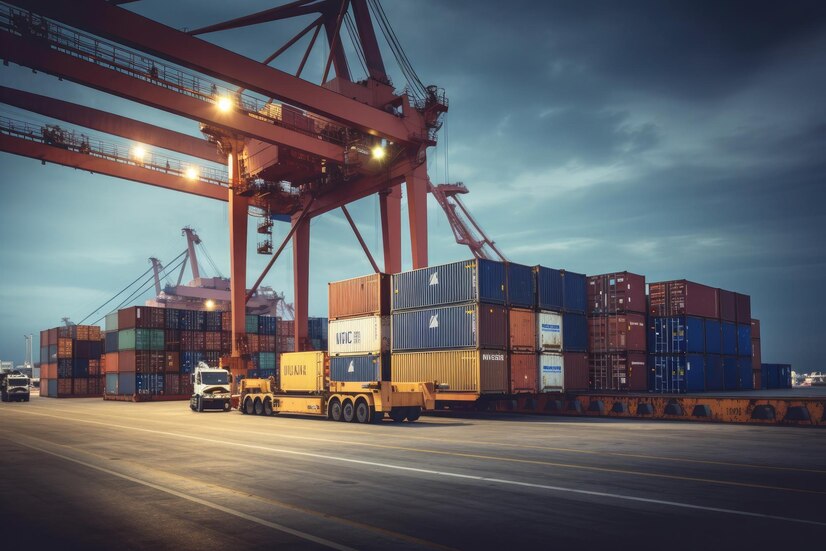Container Depots Everything You Need To Know

In the vast landscape of international trade, container depots are crucial in transporting goods across the globe. They are special places where shipping barrels are kept, cleaned, and arranged.
Whether you work in shipping or are interested in global trade, learning about container depots is useful and educational. In this blog, you will find everything you need about container depots.
Purpose Of A Container Depot
Freight Consolidation
One of the main jobs of a Container Depot is to combine freight. It’s like a center hub where shipments from different places are brought together into bigger, cheaper loads. By combining freight, the depot makes the best use of containers, which saves money and resources and makes shipping more environmentally friendly.
Communication With Logistics
In the shipping business, it’s important to talk to logistics partners. Depots for containers are important for organizing and keeping track of the flow of containers. They make it easy for shipping companies, haulers, and other people in the supply chain to talk to each other.
With accurate and timely contact, containers can be quickly routed, tracked, and delivered to their final destinations.
Repair And Cleaning Services
In shipping, containers need to be taken care of every once in a while. Container centers offer cleaning and repair services to ensure containers are in great shape for transporting goods.
Not only does regular repair make containers last longer, but it also makes sure they meet safety and legal requirements, which lowers the risk of damage during transport.
Documentation
A key part of effective logistics is having accurate and complete paperwork. Container depots are in charge of the paperwork that comes with moving containers. This includes keeping track of when packages arrive and leave, checking the cargo’s contents, and ensuring that all the necessary customs and regulatory paperwork is in order.
Reefer Storage Facility
Some storage boxes like these have cooling devices that stabilize temperatures. This keeps things that go bad quickly safe while being moved and stored. In fact, this skill is very useful in jobs where things need to stay fresh and good, like medicine, farming, and food service.
Trends In Container Depot
Container depots, integral to the global logistics ecosystem, continually evolve in response to industry trends. Several key trends shape the current landscape of container depots:
Automation
Automation, which adds efficiency and precision to various operational elements, is causing a revolution in container depots. This revolution is taking place due to the introduction of automation software.
Several automated solutions contribute to accelerating and improving the accuracy of processes, including robotic container movement and stacking equipment. Consequently, this reduces not only the amount of human labor required but also the number of errors that occur, ultimately leading to a rise in overall productivity.
IoT Technology
IoT gives container depots a better view of the supply line, which helps them make better decisions. For example, keeping an eye on the temperature of packages carrying perishable goods ensures they stay at the right level throughout the trip.
This connection not only makes operations more efficient but also makes the container depot more responsive and flexible.
Artificial Intelligence
Artificial intelligence (AI) is making changes in container depots by bringing smart ways to improve how things work. AI technologies, like machine learning techniques, are used to improve many processes. For example, predictive analytics can help decide when equipment maintenance that moves containers needs to be done so that downtime is kept to a minimum and total efficiency is raised.
AI also helps predict demand, which helps depots better plan for arriving shipments and use their resources wisely. Artificial intelligence (AI) helps sort crates better by recognizing patterns, which makes the depot run more smoothly.
Green Initiative
Container depots are increasingly turning to renewable energy sources, such as solar power, to meet their energy needs. This not only reduces carbon emissions but also contributes to cost savings over time.
Additionally, waste reduction measures, like recycling and proper materials disposal, are being implemented to create more sustainable practices. Eco-friendly container handling equipment and vehicles are being introduced to minimize the ecological footprint of depot operations.
Container Port And Terminal: The Difference
Maritime facilities are designed to make global trade smoother. They handle tasks like loading and unloading cargo, inspecting containers, and moving goods between different types of transportation. These facilities, including ports, terminals, and depots, each have specific jobs.
Container Port
A Port is a broader facility that serves as a gateway for the arrival and departure of ships. Ports are major interface points between land and water transportation, providing vessel docking areas. They handle various types of cargo, including containers, bulk goods, and general cargo.
Container Terminal
A Terminal, in the context of transportation, generally refers to a specific area where transportation modes meet and goods are transferred. In the case of container shipping, a Container Terminal is a facility within a port that specifically deals with the loading and unloading of containerized cargo onto and from ships.
Container terminals have cranes, storage yards, and other infrastructure to handle containers efficiently. Terminals are crucial nodes in the supply chain, connecting maritime transportation with other modes, such as trucks and trains.
Look Ahead To The Future In Container Depot Operations
As you look ahead to the future in container depot operations, may your journey be marked by efficiency, sustainability, and success. Whether you’re a seasoned professional or an eager learner, let your endeavors be guided by the knowledge gained in this exploration of container depots.
Read Also:


























Leave A Reply